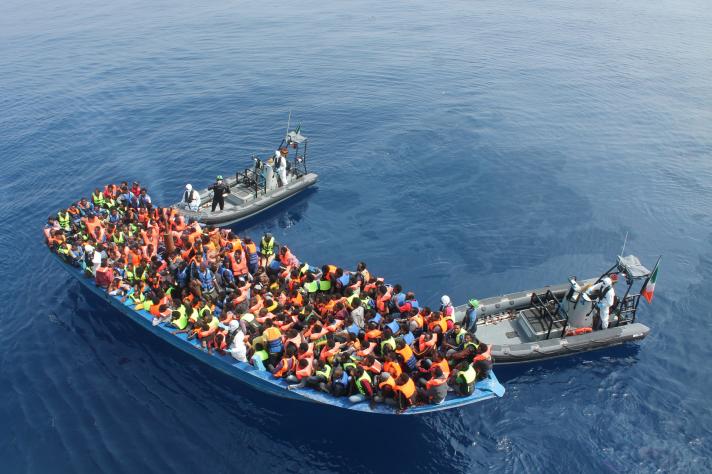Europe’s migration problem on its southern borders has been developing for decades. It has reached a crisis. In an effort to stem the flow of refugees, the EU is begun shifting responsibility to third countries – primarily African states which already face instability.
The clearest example of what these policies have led to is Libya. Roughly 4 million African migrants live there with no legal status – more than half of the country’s official population of 7.5 million. Left in chaos after Western/NATO military intervention, Libya has become a launching platform for millions hoping to reach European shores.
Yet, Libya is not alone – the European Union has exerted political pressure and negotiated financial arrangements with several African and Middle Eastern countries; the aim is to prevent migrants from reaching its borders.
Libya’s situation has become untenable, and is directly attributable to Europe’s continuous efforts to reign in its immigration problem. EU statistics (2023) show that its total population was 448.8 million, with 27.3 million non-EU citizens and 42.4 million people born outside the bloc.
Despite a recent decline (25%) in illegal border crossings, the problem remains acute with migrants primarily coming from Afghanistan, Bangladesh and Mali through West Africa and the Central Mediterranean.
It’s worth recalling the warnings of the late Libyan leader, Colonel Muammar Gaddafi, who cautioned during a meeting with Italian Prime Minister Silvio Berlusconi in 2010:
“Tomorrow Europe might no longer be European, and even black, as there are millions who want to come in.”
In 2011, just months before his death, Gaddafi remarked to Tony Blair that his removal would plunge Libya into chaos, empower terrorist groups and trigger new waves of migration to Europe.
These predictions are now a reality. After the civil war and NATO’s UN-contrived military intervention, Libya descended into anarchy becoming a main transit hub for fleeing refugees.
Lawlessness, trafficking and death at sea
Libya’s Ministry of Internal Affairs reports that there are over 4 million foreigners in Libya, most of them undocumented. Amid lawlessness, rampant drug trafficking and armed clashes, detention centers have become essentially prisons.
International NGOs have documented slave markets and abductions of migrants for forced labor or ransom. Those who attempt to reach Europe face either deportation or drowning in the Mediterranean.
UNICEF reports that more than 2,200 people died or went missing in the Mediterranean in 2024, including about 1,700 along the central route. Children and teenagers account for roughly 20% of all casualties.
Europe’s new plan for its new reality
Italy, the closest destination for many migrants, is actively pursuing a new course of action. Prime Minister Giorgia Meloni has proposed the Mattei Plan – a multibillion-euro initiative to invest in energy, agriculture, water supply, healthcare and education in African countries.
Named after Eni founder Enrico Mattei, the plan is based on a simple idea: fostering economic development in Africa to reduce incentives for migration.
At the same time, Italy is also continuing to “offshore” migrants by relocating them to third countries. The plan envisions Albania becoming a processing hub for migrants. Meloni’s scenario would establish two migrant screening centers in Albania, a non-EU member state, but directed from Rome.
Two centers have already been established in Shengjin and Gjader where migrants will await decisions on their asylum status or possible deportation. The agreement allows for up to 36,000 migrants to be relocated to Albania annually. So far, however, all attempts to transfer people there have been overturned in court for political reasons.
The UK and its failed Rwanda plan
The UK’s plan to deport migrants to Rwanda is a clear example of offshoring. Launched by Boris Johnson in 2022, the scheme aimed to forcibly deport those who arrived illegally in the UK.
In April 2024, the first migrant was flown to Rwanda under a “voluntary scheme” that offered up to £3,000 to participants. However, new Prime Minister Keir Starmer declared the plan “dead and buried,” citing its inefficiency: over several years, it affected less than 1% of illegal migrants.
Meanwhile, the number of people crossing the English Channel continues to rise: over 5,000 since the beginning of 2025 and more than 120,000 since 2018.
Europe’s deals with Tunisia, Mauritania, and Egypt
The EU has negotiated several arrangements with African countries — Tunisia in July 2023 (€1.1 billion); Mauritania in March 2024 (€210 million) and Egypt ten days later (up to €5 billion by 2027). While officially ostensibly purposed for macroeconomic stability, green energy and trade, their underlying aim is to curb migration.
A new Atlantic route
As anti-migrant policies in Libya tighten, EU asylum seekers have begun to look for new routes. According to Frontex, Mauritania has emerged as a key transit hub for migrants looking towards Europe. This helps explain the 18% increase in Atlantic route migration between West Africa and the Canary Islands in 2024.
Mauritania is also seeking to benefit more from its cooperation with Europe. In September 2024, its government demanded that the EU fulfill provisions of the March migration declaration, including easing visa procedures for Mauritanians and waiving visas for diplomats.
Mauritanian officials emphasized that only after these conditions are met will the country commit to fully cooperating in the fight against illegal migration. The agreement must be mutually beneficial: while the EU hopes Mauritania will contain the Atlantic migration flow – particularly to Spain – Mauritania is looking for investments, job creation, and increased visa access to the EU.
But the unfortunate truth suggests that – like Libya — despite the promised benefits, countries that agree to host EU migrants end up inheriting problems that only exacerbate their already fragile economic and security situations. North African states become essentially hostages to the arrangement – assuming responsibility for housing, registering and managing people’s lives that the EU seeks to “wash their hands of.” These African states and their citizens fall victim to cross-border crime, human trafficking and allegations of human rights abuses – courtesy of the European Union.


